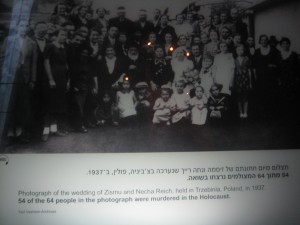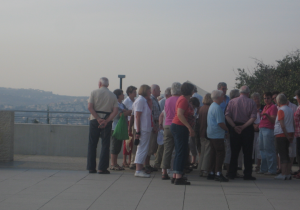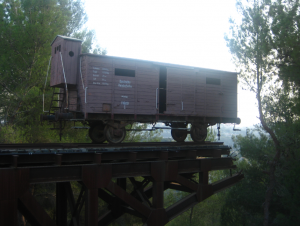Why Borat Is My Hero. A Strange And Uncomfortable Hero.
“I like to ride wild bull!”
The woman looked at me like I was a nut job.
“In my country, I ride wild bull. My teacher help.”
Her eyes were still glued to my face. She didn’t know what the hell was going on. After all, stood before her was a 16-year-old who was..Russian? American? She had no idea and neither did I.
I was trying to pretend like I was from some foreign, made up, Eastern European country. Two years later I would see Borat on television and wonder to myself if I ever encountered him on the street.

I was traveling the country on a teen tour with some friends from high school. We started off in Montana, made our way up to Seattle, down the west coast to Southern California, then to Ensenada Mexico on a cruise, and ended up in Las Vegas. As if the trip didn’t provide enough excitement on its own, I needed to spice things up by invoking some strange persona that only belongs on a stage before a crowd of tomato-throwing hooligans. I’d realize later that this wasn’t so far from the truth. At least the part about standing on a stage before a large audience.
Everywhere we went I’d engage with random strangers and introduce myself.
“Chhheloo, my name is Borris” (I had never seen Ali G or Borat until this point in my life).
“Hi Borris,” said almost everyone.
Then the real fun started.
Once their shields were down and they were open to conversation, I just jumped to it.
“Do you like to ride wild bull?” or, “Why are you wearing those funny shoes?” or [insert something ridiculous here].
The things that came out of my mouth made absolutely no sense but the people remained engaged. They were intrigued and wanted to know what this wild bull thing was all about. I think they really wanted to know what was going on, who I was, and where the hidden cameras were.
The charade continued. From cowboys in Montana to strippers standing on Las Vegas Boulevard, many people had the opportunity to meet, and react to, Borris.
Including Steve.
Steve was a person I met on the top deck of our Carnival cruise ship.

He was a short, skinny guy with blonde hair just mingling about with the other boat guests. I figured he was a good a target to stir up some nonsensical conversation with. I was dead certain his reactions would be different from the cowboy and stripper but that’s what made it fun.
“Chhello,” I said as I did 50 times before, in that strange accent. “My name is Borris, whut iz your name?”
“Chhello Borris! My name is Vladimir.”
My brain started, “What the..”
He responded with the same accent. For all I knew he was actually from the real country I was mocking, wherever that is. I started to get nervous. It was all fun and games but now I was blatantly insulting some guy’s culture and language. As the grandchild of Holocaust survivors, I don’t take that kind of thing lightly either.
“uhh…hi Vladimir.”
Now I was committed.
Before long we were talking about wild bulls, Russia, and some other arbitrary topics. The conversation got very uncomfortable, very fast, until I just broke my cover.
“Hey man, I’ve been kidding the whole time. I’m sorry. I didn’t mean to offend you.” I felt better but still equally as guilty.
“My name is Dan and I’m really from New Jersey.”
He started to laugh. I couldn’t tell if he thought it was funny or was about to throw me off of the boat.
“Dude, it’s all good. My name is Steve and I’m a comedian from L.A.”
The next thing I knew he was telling me about his life, his career as an aspiring comedian, and the comedy show he was scheduled to perform later that night in front of the entire cruise ship. He was part of the ship’s entertainment and was supposed to do stand up in front of the 2,500 passengers.
“Dan, why don’t you do the show with me later?”
I thought about it for a moment.
Am I funny? Nope. Am I a good public speaker? Nope. Am I ever going to see these people again? Nope.
“Alright I’m in.”
Later that night my friends were showering up, changing, and getting ready to attend the ship’s 8pm evening activity in the main theater. A theater that seated all 2,500 passengers.
I was also getting ready to attend the show but also getting ready for the biggest public appearance of my life.
Behind the stage Steve conducted a pre-game ceremony with me. It was like we were about to head on to the soccer field and play for the state championship only we were two people, not eleven. He even said some prayers like many sports teams do when they huddle up.
Then the theater speakers came on and started to speak to the crowd.
“And now I’d like to welcome…”
The host for the night called our names and on we went.
The lights were extremely bright as I looked out into the crowd. And there they were. All 2,500 people from the boat. Staring at us, just waiting for us to be funny as comedians should be. I was in an anything-but funny mood once I saw all of those people.
The show went on…
He did some act that had to do with the Titanic and Leonardo Dicaprio. I did something related to Borris.
The audience applauded, we walked off and I remembered thinking about how horrible and awesome the experience was. It was both terrifying and exhilarating, but most of all it was uncomfortable.
At that moment I realized that the most interesting and opportunistic experiences come from situations that are both unexpected and uncomfortable. We find our best moments when we take the path less traveled and when we live life without conforming to the status quo. I could have sat in one of those 2,500 chairs and watched Steve with my friends. Instead, I joined Steve on stage for 20 minutes. A brutal but very exciting 20 minutes.
Steve gave me his card and told me to call him so we could develop a standup routine together. He wanted me to join him in Los Angeles full time. I put it in my pocket but had no intention of calling him. I didn’t think I was funny but at that moment I realized that life was.
The boat arrived back in California. We got off and I continued on with the strange Borris character.
Strange indeed. Just like this post.
Publish.








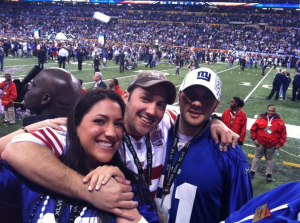

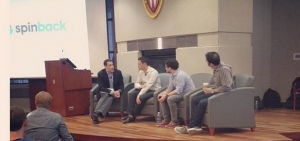
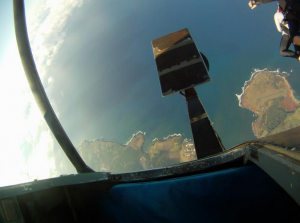
 (Istanbul, Turkey)
(Istanbul, Turkey)


